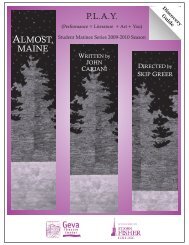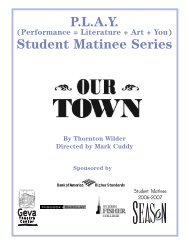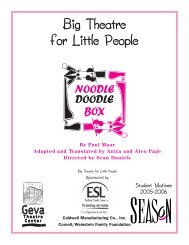Written by Steven Dietz Directed by Peter Amster - Geva Theatre
Written by Steven Dietz Directed by Peter Amster - Geva Theatre
Written by Steven Dietz Directed by Peter Amster - Geva Theatre
Create successful ePaper yourself
Turn your PDF publications into a flip-book with our unique Google optimized e-Paper software.
Fear of the Unknown<br />
Scenic designer Robert Mark Morgan observes:<br />
“Mystery was a key idea that <strong>Peter</strong> [<strong>Amster</strong>, the director] and I kept discussing. So much of<br />
this story is about the unknown, and the surprise that comes from not knowing. The world<br />
of this play and the scenery that resulted has a relatively simple approach -- although of<br />
course it has some elements which are technically complex. But one of the essential<br />
priorities was to create a big, black void, where we don’t know what’s waiting, what’s<br />
coming, or where someone will appear next. It’s uncomfortable, I hope, for the audience not<br />
to know exactly how large, or how deep the space is. Then, within this void, furnishings are<br />
like a Faberge egg: we use really fine detail, rich and exquisite, surround <strong>by</strong> the black<br />
emptiness.” The tension between the familiar, civilized world, and the unexpected,<br />
unbounded darkness outside reflects the mystery of the play.<br />
Jennifer<br />
Joan<br />
Thompson<br />
as Lucy<br />
looks out a<br />
window<br />
designed <strong>by</strong><br />
Robert Mark<br />
Morgan; the<br />
lighting<br />
design <strong>by</strong><br />
Christine<br />
Binder and<br />
costume<br />
design <strong>by</strong><br />
Tracy<br />
Dorman<br />
Composer Gregg Coffin created a score for this production’s transitional music and<br />
scenes, and offers his perspective on the atmosphere of Dracula:<br />
“Underscoring music is usually at the whim of the director. Some directors hate it, others<br />
are more apt to utilize it. <strong>Peter</strong> <strong>Amster</strong> falls into the latter camp. He grew up as a great<br />
musician and musical director. He knows what music can do underneath a scene. He and I<br />
use underscoring music very sparingly here in smaller scenes and with great gusto in some<br />
of the more powerful moments in the production.<br />
“I listened to horror movie scores because you have to when you’re writing the music for<br />
Dracula. Franz Waxman (Bride of Frankenstein), Jo LoDuca (Evil Dead, Boogeyman), John<br />
Carpenter (Halloween), Jerry Goldsmith (The Omen), Bernard Herrmann (Psycho) and John<br />
Williams (Jaws) all have their hands in my music for this production. To listen to Williams’<br />
main theme from Jaws is to hear and understand the idea of something wicked coming your<br />
way – slowly at first, just as you’re beginning to understand something isn’t quite right and<br />
then much more quickly, as you realize that you are in grave danger. Brilliant composition.<br />
You don’t see the shark for a good portion of the movie, but you sure hear it.” �<br />
“What I know of you, Lucy, is terribly dear to me. What I will never know of<br />
you, is dearer still.” – Seward<br />
8<br />
The composer says<br />
to listen for:<br />
How much of the<br />
score is written in<br />
a minor key.<br />
Melodies are<br />
written to build.<br />
As the characters’<br />
knowledge of what<br />
is happening to<br />
them builds, so<br />
does the musical<br />
structure. Up until<br />
then, music just<br />
repeats itself in<br />
small phrases.<br />
The use of animal<br />
sounds: feral wolf<br />
cries, bat wings,<br />
rat screams have<br />
all been modulated<br />
to fit into the keys<br />
of the music.<br />
They’ve also been<br />
lengthened and<br />
shortened to fit<br />
into the rhythm.<br />
Dracula is<br />
described as being<br />
many different<br />
animals. You’ll<br />
hear their melodies<br />
in the music.<br />
Heartbeats. Blood<br />
is important to<br />
Dracula. Our<br />
bodies all have an<br />
internal rhythm<br />
of a heartbeat. It<br />
quickens with<br />
danger and dread.<br />
It slows at other<br />
times. The “pulse”<br />
of the score<br />
follows the arc<br />
of <strong>Dietz</strong>’s<br />
story-telling.





